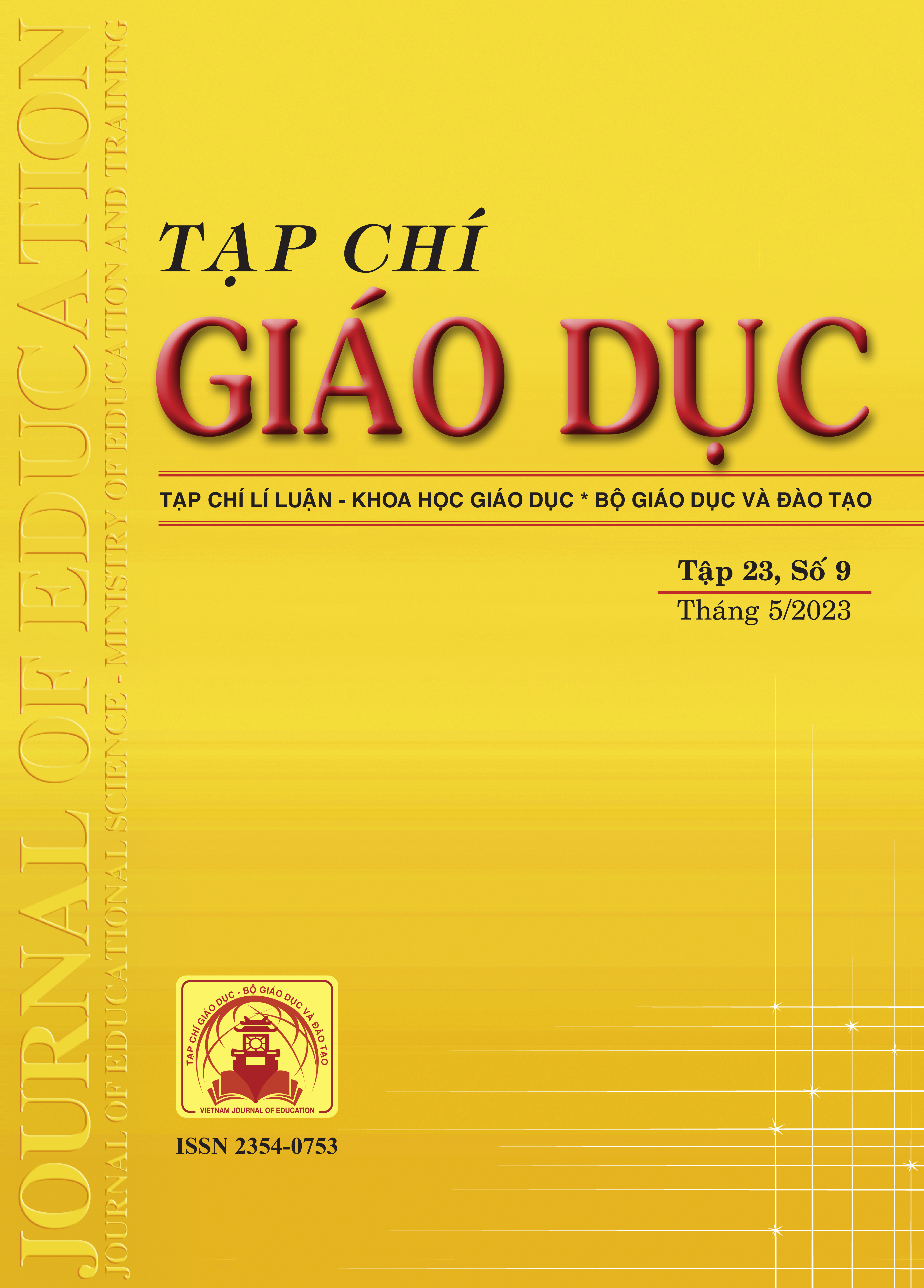Đề xuất quy trình vận dụng mô hình giáo dục trải nghiệm của David Kolb trong tổ chức hoạt động giáo dục kĩ năng cảm xúc xã hội cho trẻ mẫu giáo 5-6 tuổi
Tóm tắt
Experiential activities play an important role in capacity formation and comprehensive development of young personality. Experiential education is one of the methods to promote the activeness and initiative of learners in acquiring knowledge. Based on some theoretical issues on experiential education and David Kolb's experiential education model, the article points out the advantages of experiential education for social skills education for 5-6 year old preschool children, the study proposes the process of applying David Kolb's experiential education model in educating social-emotional skills for 5-6-year-old preschoolers in order to develop children's social skills comprehensively and sustainably.
Tài liệu tham khảo
Alzahrani, M., Alharbi, M., & Alodwan, A. (2019). The Effect of Social - Emotional Competence on Children Academic Achievement and Behavioral Development. International Education Studies, 12(12), 141-149. https://doi.org/10.5539/ies.v12n12p141
Bộ GD-ĐT (2009). Chương trình giáo dục mầm non (ban hành kèm theo Thông tư số 17/2009/TTBG-DĐT ngày 25/07/2009 của Bộ trưởng Bộ GD-ĐT).
Bredekamp, S., & Copple, C. (1997). Developmentally Appropriate Practice in Early Childhood Programs. Washington, DC: National Association for the Education and Young Children.
CASEL (Collaborative for Academic, Social, and Emotional Learning) (2008). SEL assessment, tools, needs and outcome assessments. Chicago, Illinois: Collaborative for Academic, Social, and Emotional Learning.
Curby, T. W. , Brown, C. A., Bassetta, H. H., & Denham, S. A. (2015). Associations Between Preschoolers’Social-Emotional Competence andPreliteracy Skills. Infant and Child Development Inf. Published online in Wiley Online Library (wileyonlinelibrary.com).
Dewey, J. (1916). Dân chủ và giáo dục (bản dịch của Phạm Anh Tuấn). NXB Tri thức.
Dewey, J. (2012). Kinh nghiệm và giáo dục (bản dịch của Phạm Anh Tuấn). NXB Tri thức.
Fewell, R.R., & Kaminski, R. (1988). Play skills development and instruction for young children with handicaps. In S. Odom & M. Karnes (Eds.), Early intervention for infants and children with handicaps (pp. 145-158). Baltimore, MD: Paul Brookes.
Kolb, D. (1984). Experiential learning: Experience as the source of learning and development. Englewood Cliffs, N.J: Prentice-Hall.
Nguyễn Hữu Tuyến (2017). Tổ chức dạy học khái niệm, định lí trong môn Toán cho học sinh trung học cơ sở qua hoạt động trải nghiệm. Tạp chí Giáo dục, số đặc biệt kì 1 tháng 10, 72-76; 39.
Nguyễn Mạnh Tuấn, Hoàng Thị Phương (2017). Thực trạng tổ chức hoạt động trải nghiệm cho trẻ ở trường mầm non. Tạp chí Giáo dục số đặc biệt tháng 12, 20-23.
Nguyễn Thị Mỹ Trinh (2021). Định hướng phát triển chương trình giáo dục mầm non theo tiếp cận năng lực ở Việt Nam sau năm 2020. Hội thảo khoa học “Định hướng phát triển chương trình giáo dục mầm non theo tiếp cận năng lực ở Việt Nam sau năm 2020”. Viện Khoa học Giáo dục Việt Nam - Trung tâm Nghiên cứu giáo dục mầm non, tr 46-57.
Nguyễn Thị Trầm Ca, Phan Thị Thúy Hằng (2019). Biện pháp tổ chức hoạt động trải nghiệm Steam cho trẻ mầm non. Tạp chí Khoa học, Trường Đại học Sư phạm Hà Nội 2, 64, 85-95.
Nguyễn Văn Hạnh, Nguyễn Hữu Hợp, Nguyễn Thị Cúc (2014). Bản chất và các mô hình của học tập dựa trên kinh nghiệm. Tạp chí Khoa học, Trường Đại học Sư phạm Hà Nội, 59(6), 149-158.
Quản Hà Hưng (2016). Áp dụng quy trình giáo dục trải nghiệm của David Kolb vào việc tổ chức rèn luyện nghiệp vụ sư phạm cho sinh viên Khoa Giáo dục tiểu học. Tạp chí Giáo dục, số đặc biệt kì 1 tháng 7, 274-277.
Rose-Krasnor, L., & Denham, S. (2009). Social-emotional competence in early childhood. In K. H. Rubin, W. M. Bukowski, & B. Laursen (Eds.), Handbook of peer interactions, relationships, and groups (pp. 162-179). New York, NY: Guilford Press.
Tải xuống
Đã Xuất bản
Cách trích dẫn
Số
Chuyên mục
Giấy phép

Tác phẩm này được cấp phép theo Ghi nhận tác giả của Creative Commons Giấy phép quốc tế 4.0 .












